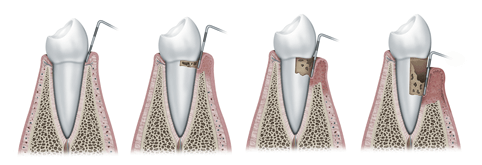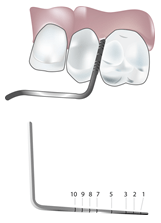Periodontics
What Is Periodontics?
Periodontics is a branch of dentistry that deals with the structures that surround and support your teeth — namely, gum tissue, ligaments and bone.
What Is Periodontal Disease?
Periodontal disease, commonly called gum disease, is an acute or chronic inflammation and infection of the gums and/or surrounding tissue. Believe it or not, it is periodontal disease, not decay, that is responsible for about 70% of all tooth loss!
What Causes Gum Disease?
Genetics can be a factor in periodontal disease, but a more common factor is lifestyle. Poor diet, smoking or chewing tobacco, stress, certain medications and diseases, such as cancer, leukemia and AIDS, can all interfere with your body’s ability to fight off infection. Uncontrolled diabetes and even pregnancy can make gum disease more severe and more difficult to control.

But the primary cause of gum disease is bacteria, more specifically bacterial plaque — a colorless, sticky film that constantly forms on your teeth.
If the plaque isn’t removed on a daily basis by correctly brushing and flossing, it can harden and form calculus, also called tartar that brushing doesn’t clean. Only a professional cleaning by a dentist or dental hygienist can remove tartar.
The longer plaque and tartar are on your teeth, the more harmful they become. The bacteria cause inflammation of the gums that is called gingivitis. When you have gingivitis, your gums become red, swollen and can bleed easily. Gingivitis is a mild form of gum disease that can usually be reversed with daily brushing and flossing, and regular cleaning by a dentist or dental hygienist. This form of gum disease does not include any loss of bone and tissue that hold teeth in place.
When gingivitis is not treated, it can advance to periodontitis, which is “inflammation around the tooth”. When the bacteria in your mouth continue to grow, they produce and release more toxins that irritate your gums.
Then these toxins actually cause the breakdown of the fibers that hold your gums tightly to your teeth. Since your gums have a looser hold on your teeth, a pocket is able to form in between and the pocket begins to fill with even more bacteria and toxins.
The body’s immune system fights the bacteria as the plaque spreads and grows below the gum line. Bacterial toxins and the body’s natural response to infection start to break down the bone and connective tissue that hold teeth in place.
If not treated, the bones, gums, and tissue that support the teeth are destroyed. The teeth may eventually become loose, have to be removed or just fall out on their own while the person is eating or even sleeping.
Is Periodontal Disease Very Common?
Absolutely! Our U.S. Surgeon General has said that 80-90% of American adults have some form of periodontal disease. In fact, periodontal disease of the gums and bone that support our teeth is so common that the Texas State Board of Dental Examiners requires that dentists perform and record a periodontal examination for every patient of record!
Do I Need To Worry About Gum Disease?
Worry only if you have it. If you have gum disease, you need to get it handled. When disease exists in your mouth, bacteria and toxins that are on, in or under your gums will also circulate throughout your entire body by way of your bloodstream, creating or worsening a number of health concerns such as:
How Do I Know If I Have Gum Disease?
The more obvious signs of gum disease are:
Unfortunately, even if you don’t have any of these symptoms, it does not mean that you do not have gum disease. Your best course of action is to be sure your dentist periodically performs a periodontal examination. Early diagnosis and treatment is vital!
How Is Gum Disease Treated?
If caught in its early stages, the treatment of gum disease usually includes cleaning the teeth above and below the gum line and irrigating the gum pockets with antimicrobials (germ killers) or antibiotics.
After that, controlling the problem is usually easy with routine visits with the hygienist, combined with excellent home care. For resistant or recurring problems, we also use laser or continued antibiotic therapy. Yes, it is a must that you do your part daily by meticulously cleaning EVERY SURFACE of EVERY TOOTH at least ONCE per day! You can do it! We have thousands of patients who do!
If caught in the later stages of gum disease, it may require surgical or laser treatment along with the removal of the hardened plaque and smoothing of the root surfaces. Once again, proper daily cleaning is very important for healing and a satisfactory result.
What Are The Benefits Of Periodontal (Gum) Treatment?
FAQ About Gum Disease
How does my diabetes cause gum disease?
Diabetes is a medical problem, not treated by dentists, but can play a role in periodontal disease development. Since diabetics have reduced infection resistance and slower healing rates, they are more LIKELY to get periodontal disease. In fact, diabetes and periodontal disease are commonly found together and they both can make the other worse.
I received treatment. Why do I need periodontal maintenance?
If you have been diagnosed with periodontal disease and have already undergone treatment, it is very important that your teeth and gum areas are routinely deep-cleaned and medicated. Our hygienist is an expert in this area and will carefully re-clean those areas under the gumline — the “pocket” areas. These are places in your mouth where the worst bacteria can grow and multiply to destroy your teeth and surrounding bone, and dump powerful toxins into your bloodstream, which can contribute to major systemic diseases such as heart disease, stroke, diabetes and even pancreatic cancer.
The last few years we have added laser treatment to help kill the bacteria in the pockets with good success. , we are all about helping your oral health which significantly contributes to your overall health … and that means quality of life!!
Why don’t other dental offices do the periodontal measurement to check for gum disease?

I hope they do! I can’t answer for any office who does not adequately measure the pockets and record them in an orderly fashion. We always do this on every new patient exam, and at recall visits.
I CAN tell you it SHOULD be done, and is considered malpractice if it is not. It would be like your physician not weighing you or checking your blood pressure. These things are “Standard of Care” in most places.
Why can’t I just get a cleaning instead of periodontal maintenance?
These are 2 different procedures that help you in different ways. Dental “cleaning”, also called prophylaxis, will only clean and smooth the teeth ABOVE the gum line. Many times fluoride is applied. It is easier, quicker, and cheaper than periodontal procedures. It feels and looks nice, but does almost nothing for periodontal disease. Once a person has been diagnosed with periodontitis they need initial active treatment, and then follow up periodontal maintenance care. This addresses the issues BELOW the gum line that are causing bone loss, bad breath, and tooth loss.
Why do my gums bleed?
Usually because they are INFECTED with various bacteria !Healthy gums are firm and do not bleed with brushing or probing. Other things can cause bleeding gums, so it is important to get it properly diagnosed.
Why do I need to floss?
Because proper flossing removes plaque and food particles from between the teeth.If you don’t floss you are leaving that junk in there to cause infection, bone loss, bad breath, and bacteria in your bloodstream, to name a few reasons. Just GOOGLE on your computer all the connections between periodontal disease, cardiovascular diseases, stroke, pancreatic cancer, low birth weights, etc. , you’ll be amazed ! A healthy mouth is an excellent way to help your overall health!
